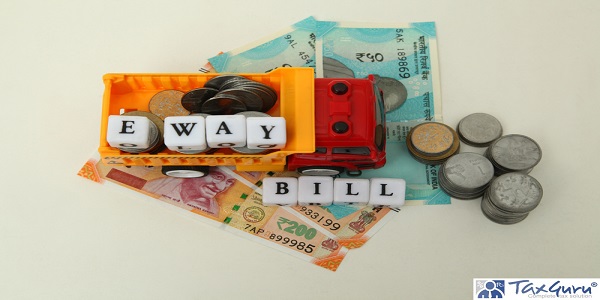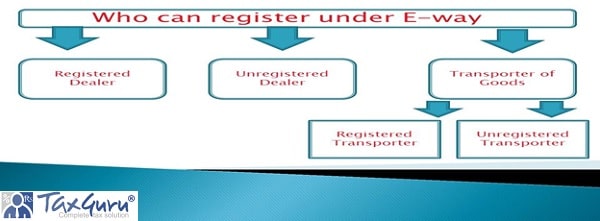On 1st July 2021, our beloved Goods and Service tax Act celebrated its 4th Birthday. GST was introduced for 3 major purposes as One nation One tax, ease of compliances and seamless flow of credits to remove the cascading effects of the taxes. However in the last 4 years GST is reshaping itself by more than 900 amendments through Notifications, Circulars and Press release, accordingly we can say it is changing day by day. In this article, author has discussed the topic of ‘E-way Bill under Goods and Services Tax (GST)’.
Page Contents
What is E-way Bill?
E-way bill is an electronic permit or electronic generated document for movement of goods from one place to another place which is to be generated on the E-way bill portal i.e. on www.ewaybillgst.gov.in.
Earlier before the introduction of GST, there was no concept of electronic way bill. However, the need to have check and balances in the present has been felt necessary to discourage the parallel economy. Introduction of E-way Bill in India has been effected for inter-State movement of goods across the country from 1st April 2018 and on notified dates by respective State Government for intra state movements.

When should E-way Bill be generated?
If the value of goods of consignment is more than Rs. 50,000/- except for certain specified goods meant for Job work, goods meant for export with Customs seal from factory to Port, airport, ICD, imported goods, goods sent on approval basis, exhibition or fairs purposes , removal for testing , removal from factory to weighbridge for weighment of goods and back to factory up to 20 kms., inward supply from unregistered person, SKD/CKD, Sales return, For own use and exempted goods.
Accordingly, E-way Bill shall mandatorily generated on the common portal for all types of movements if the value of goods exceeds more than Rs. 50,000/-, however E-way Bill needs to be generated mandatory even if the value of consignment of goods is less than Rs. 50,000 where –
1. Movement of goods in inter-state by principal to the Job-worker;
2. Handicraft goods are transported from one State or Union territory to another State or Union territory by a person who has been exempted from the requirement of obtaining registration under clauses (i) and (ii) of section 24 of the CGST Act.
Here, the term “Consignment Value”, means value determined as per section 15 of the CGST Act as mentioned on the invoice, bill of supply or delivery challan as the case may be including the applicable tax thereon. However, such consignment value shall exclude the value of exempted supply, where the invoice is issued in respect of both exempt and taxable supply of goods. (“Notification No. 12/2018”)
Who should generate E-way Bill?
The primary responsibility to generate E-way Bill shall be of the registered person who causes the movement of goods, i.e. the consignor or the consignee, as the case may be. However, if such consignor or consignee doesn’t generate the EWB, it may be generated by transporter as well, if authorized by the registered person. In case of supply of goods by an unregistered person to registered person, the liability to generate EWB is on the recipient.

As per revised Rule 138 (2) under Notification No. 12/2018, it has been provided that E-way Bill shall be required to be generated, in case the goods are transported by consignor or consignee in his own vehicle or in a hired one or a public conveyance, by road. In such case, the registered person causing the movement of goods may raise the EWB after furnishing the vehicle no. in Part B of FORM GST EWB – 01 if the value of goods being transported is more than Rs.50,000/-.
Railway has been exempted from generation and carrying of e-way bill with the condition that without the production of e-way bill, railways will not deliver the goods to the recipient. But railways are required to carry invoice or delivery challan, etc.
When E-way Bill is not required to be generated?
In the following cases E-way Bill is not required to be generated:
(i) the goods being transported are specified in Annexure under Rule 138(14) of the Central Goods and Services Tax Rules,2017;
(ii) the goods are being transported by a non-motorized conveyance;
(iii) the goods are being transported from the port , airport, air cargo complex and land Customs Station to Inland Container Depot or Container Freight Station ( for clearance by Customs);
(iv) the movement of goods within areas notified under clause (d) of sub-rule (14) of the Goods and Services Tax Rules of the Concerned State;
(v) goods ( other than de-oiled Cake) specified in the Schedule appended to Notification No.2/2017-C.T.(Rate), dated the 28th June,2017, i.e. goods exempted from GST;
(vi) alcoholic liquor for human consumption, petroleum crude, high speed diesel, motor spirit (commonly known as petrol), natural gas or aviation turbine fuel;
(vii) goods which have been declared as ‘ no supply’ in Schedule III of CGST Act,2017;
(viii) where the goods are being transported under Customs bond from an inland container depot or a container freight station to a Customs port, airport, air cargo complex and land Customs station, or from one Customs station or Customs port to another Customs station or Customs port, or under Customs supervision or under Customs seal;
(ix) where the goods being transported are transit cargo from or to Nepal or Bhutan;
(x) where the goods being transported are exempt from tax under Notification No. 7/2017-C.T.(Rate), dated 28th June,2017 as amended from time to time and Notification No. 26/2017-C.T.(Rate), dated the 21st September,2017 as amended from time to time;
(xi) any movement of goods caused by defence formation under Ministry of defence as a consignor or consignee;
(xii) where the consignor of goods is the Central Government, Government of any State or a local authority for transport of goods by rail;
(xiii) where empty cargo containers are being transported; and
(xiv) where the goods are being transported upto a distance of twenty kilometers from the place of business of the consignor to a weighbridge for weighment or from the weighbridge back to the place of business of the said consignor subject to condition that the movement of goods is accompanied by a delivery challan issued in accordance with Rule 55.
Blocking and Unblocking of E-way Bill:
- E-way bill generation is blocked for taxpayers who have not filed their returns for the previous two consecutive months/quarters.
- Thus, if a taxpayer has not filed GSTR-3B for two or more consecutive months, then he/she cannot generate e-way bills to do dispatches and receive goods, resulting in a standstill.
- Only when a taxpayer files GSTR-3B, the e-way bills will get unblocked on the next day.
- The system of e-way bill blocking was implemented from the 2nd of December 2019.
For example, if a taxpayer has not filed his GSTR-3B for April 2021 and May 2021, then his GSTIN will get blocked in the e-way bill portal from June. The main intention of the government is to track down the non-filers of GST returns and make them compliant.
What if E-way is not generated?
If the suppliers or transporters are not generating the e-way bills, the same will be considered as contravention of statutory provisions of GST law.
As per Section 122 (xiv) of the CGST Act,2017, a taxable person who transports any taxable goods without the cover of specified documents / e.way bill shall be liable to pay a penalty of Rs.10,000/- or an amount equivalent to the tax evaded.
As per section 129 of CGST Act.2017, where any person transports any goods or stores any goods while they are in transit in contravention of the provisions of this Act or the rules made thereunder, all such goods and conveyance used as a means of transport for carrying the said goods and documents relating to such goods and conveyance shall be liable to detention or seizure to recover applicable tax and penalty from the person transporting goods and the owner of the goods.
Some of the important judicial pronouncement on E-way Bill:
| S. No. | Case Name | Issue & Summary |
| 1. | M/s K.B Enterprises Vs Asst. Commissioner State Taxes & Excise-2019(12) TMI 1089-GSTAA-HP | Section 129 proceeding cannot be initiated for Minor mistake(s) in e-way bill- The minor mistakes in Part-B of the e-way bill, (error in one or two digits/characters of the vehicle number) will not invite detention order and only penalty of Rs 1000/- (CGST- Rs 500/- & SGST-Rs 500/-) will become due to payable. |
| 2. | Godrej Consumer Products Ltd. Vs ACST&E-Cum- GIB/HP/ Godrej Consumer/11-02-2020/HC-67 | Typographic error in entering distance in E-way bill is minor mistake- Due to a typographic error while generating E-way bill, the petitioner mentioned approx distance between Puducherry to Himachal Pradesh as 20 Kilometers instead of 2000 Kilometers. As a result, a validity of one day has been calculated by the E-way bill portal instead of twenty days and the E-way bill subsequently got expired on the very next day. The consignment was intercepted on dated 15th Sep, 2018 and thereby a tax/penalty has been imposed under section 129 of HPGST/CGST Act, 2019 for contravention of Rule 138. However, it was held by the Hon’ble HC that typographic error may be treated as a minor one and in such case, if the demand and penalty have been levied by the proper officer u/s 129, the same need to be refunded to the supplier. |
| 3. | Hindon Machinery Tools Vs State of U.P.- 2019 (22) G.S.T.L. 4 (All.) | Release of the seized goods for writing wrong Tax Invoice No. on E-way Bill- Incorrectly mentioning the number of tax invoices as tax invoice number on E-way Bill- Prima facie, there seems no discrepancy in E-way Bill attracting seizure of goods. Goods directed to be released without insisting for a deposit of any amount and furnishing security as GST already paid on goods. |
| 4. | Daily Fresh Fruits India Private Limited v. Commissioner, SGST, 2020-VIL-115- KER | Detention of goods on the ground of wrong classification of goods- The High Court quashed detention order on the ground that this was a bona-fide case of dispute in the classification of goods and directed release of goods. |
| 5. | Commercial Steel Company v. Assistant Commissioner of State Tax, 2020-VIL- 116-TEL | Goods cannot be detained just because driver has taken a different route- The High Court observed that vehicle was found at another place does not automatically lead to any presumption that there was an intention of evasion of tax. |
| 6. | Kun Motor Co. Pvt. Ltd. Versus Assistant State Tax Officer, Kerala State GST Department, Thiruvananthapuram- 2019 (21) G.S.T.L. 3 (Ker.) | Incidence of Tax is on Supply and not on nature of transport- A person from Trivandrum goes to Pondicherry, purchases a car, and entrusts it to the car dealer to transport it to Trivandrum. On the way, in Kerala, the officials under the GST Act, intercept the vehicle and detain the goods, for no e-way bill accompanies the consignment. The High Court held that detention of car was illegal. |
*****
(Any query and suggestion kindly contact the author at: cs.sandeepchauhan@gmail.com)
Disclaimer: The entire contents of this document have been prepared on the basis of relevant provisions and as per the information existing at the time of the preparation. Although care has been taken to ensure the accuracy, completeness, and reliability of the information provided, I assume no responsibility, therefore. Users of this information are expected to refer to the relevant existing provisions of applicable Laws. The user of the information agrees that the information is not professional advice and is subject to change without notice. I assume no responsibility for the consequences of the use of such information.





